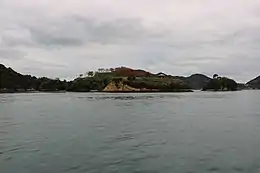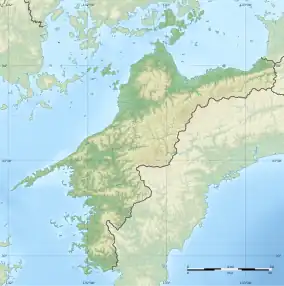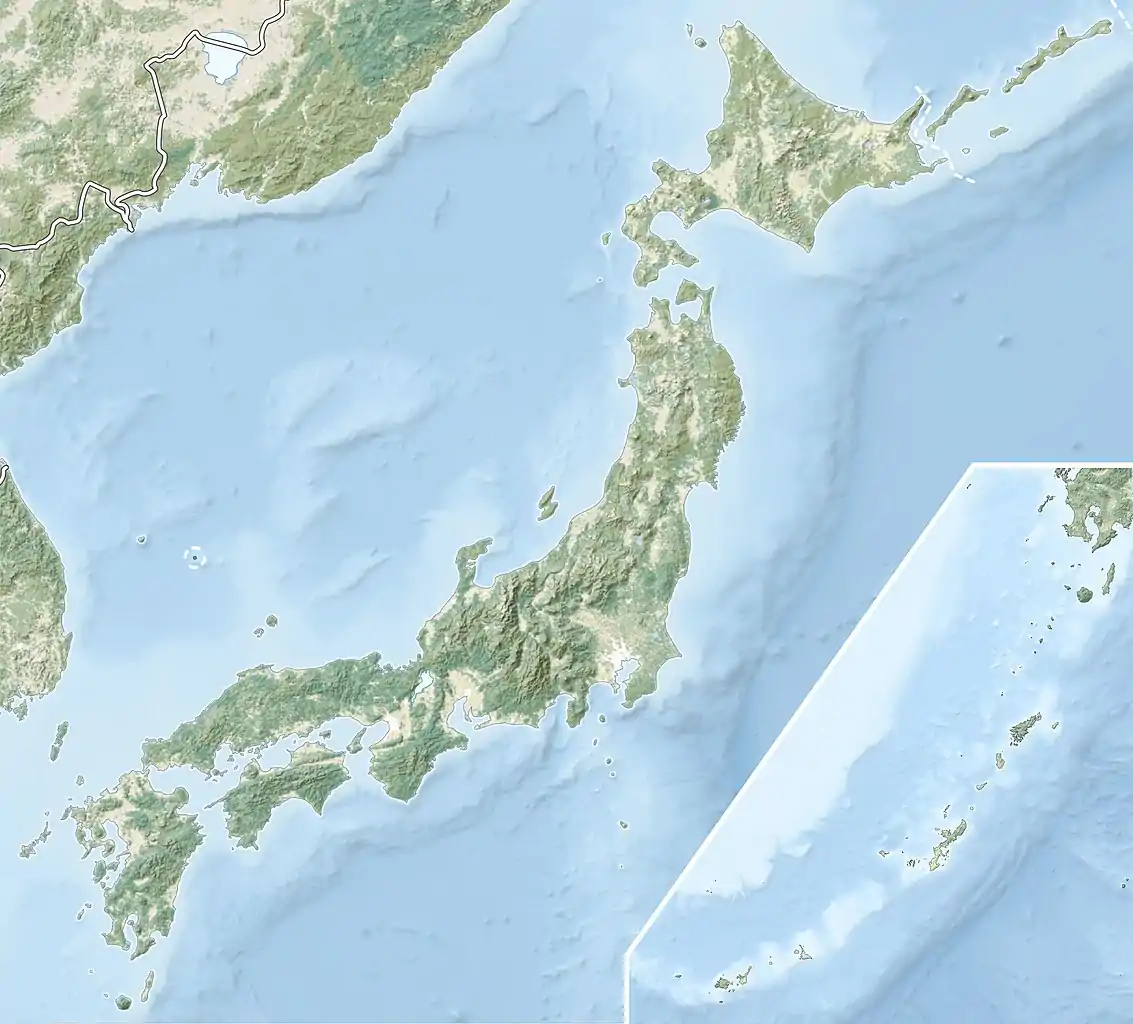Native name: 能島 | |
|---|---|
 Noshima viewed form the northwest | |
 Noshima  Noshima | |
| Geography | |
| Location | Seto Inland Sea, Japan |
| Coordinates | 34°10′58″N 133°04′51″E / 34.182833°N 133.080845°E |
| Archipelago | Japanese Archipelago |
| Area | 0.015 km2 (0.0058 sq mi)[1] |
| Coastline | 0.85 km (0.528 mi)[1] |
| Administration | |
Japan | |
| Prefecture | Ehime Prefecture |
| City | Imabari |
| Demographics | |
| Population | uninhabited (2019)[2] |
Noshima (能島) is a small, uninhabited island within the Geiyo Islands of the Japanese Inland Sea. Administratively, it forms part of the city of Imabari, Ehime Prefecture. In the late mediaeval period, the island was occupied by Noshima Castle and, together with the surrounding area, was the base of the Noshima Murakami, one of the three main houses of the Murakami kaizoku.[3][4] In his Historia de Iapam, Luís Fróis described Noximadono (i.e., the lord of Noshima) as o mayor corsario de todo Japaõ, "the greatest corsair in all Japan".[1][5][6] The island castle, together with tiny Taizakijima immediately to the south,[2] has been designated a National Historic Site,[7] and is an element of Japan Heritage "Story" #036,[8] while Noshima is also afforded protection as a Class I Special Zone within Setonaikai National Park.[9] There is no scheduled service to the island, which may be approached by a vessel chartered from Miyakubo Port (宮窪港) on nearby Ōshima.[1]
.jpg.webp) 1953 US AMS map showing Hiroshima Prefecture and, across the sea to the south, Imabari in Ehime Prefecture; Noshima is the small unmarked island towards the bottom right, between "Ō-shima" and "U-shima"
1953 US AMS map showing Hiroshima Prefecture and, across the sea to the south, Imabari in Ehime Prefecture; Noshima is the small unmarked island towards the bottom right, between "Ō-shima" and "U-shima".jpg.webp) 1945 US AMS map showing, near the bottom, "No Jima", between "Ō-shima" and "U-shima", and "Taisaki-Shima", immediately to the south
1945 US AMS map showing, near the bottom, "No Jima", between "Ō-shima" and "U-shima", and "Taisaki-Shima", immediately to the south.jpg.webp) Noshima Murakami "flag pass", issued to a priest at Itsukushima in Aki Province and dated to Tenshō 9.4.28 (1581), followed by the signature Takeyoshi (Yamaguchi Prefectural Archives)[3]
Noshima Murakami "flag pass", issued to a priest at Itsukushima in Aki Province and dated to Tenshō 9.4.28 (1581), followed by the signature Takeyoshi (Yamaguchi Prefectural Archives)[3]
See also
References
- 1 2 3 4 能島 [Noshima] (in Japanese). Imabari City. Retrieved 21 August 2020.
- 1 2 能島 [Noshima]. Digital Daijisen Plus (in Japanese). Shōgakukan. 2019.
- 1 2 Shapinsky, Peter D. (2009). "Predators, Protectors, and Purveyors: Pirates and Commerce in Late Medieval Japan". Monumenta Nipponica. Sophia University. 64 (2): 292, 301.
- ↑ "Japan Heritage: Murakami Kaizoku" (PDF). Onomichi City. Retrieved 21 August 2020.
- ↑ Petrucci, Maria Grazia (2017). Cast in silver: the rise and demise of Kyushu corsairs in a unifying Japan, 1540–1640 (Thesis). University of British Columbia. p. 25.
- ↑ Vicki, José, ed. (1976). Luis Frois, Historia de Japam. Vol. 4. Biblioteca National de Lisboa. p. 249.
- ↑ 能島城跡 [Noshima Castle Site] (in Japanese). Agency for Cultural Affairs. Retrieved 21 August 2020.
- ↑ "Story #036 Murakami Kaizoku". Agency for Cultural Affairs. Retrieved 21 August 2020.
- ↑ 愛媛県地域(今治北) [Setonaikai National Park: Ehime Region (Imabari City)] (in Japanese). Ministry of the Environment. Retrieved 21 August 2020.
External links
- (in Japanese) Detailed maps of Setonaikai National Park (Ministry of the Environment; Noshima is in 愛媛県地域(今治北))